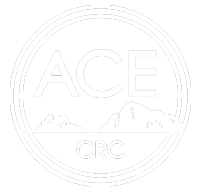The new Antarctic Climate and Ecosystems CRC
Since the last newsletter the ACE CRC has been successfully reincarnated. The ’new’ ACE CRC began on 1 January 2010, and, at the time of writing, almost all the official paperwork has been signed sealed and delivered. In this round the CRC is funded to the end of June 2014. So, what research will the ACE CRC be doing?
ACE will be investigating the critical scientific uncertainties, highlighted by the Intergovernmental Panelon Climate Change, that limit Australia’s and the global community’s ability to respond effectively to climate change. Antarctica and Southern Ocean processes influence regional and global climate inprofound ways, and the Southern Ocean is likely to experience many changes, and some sooner than otherparts of the globe.Our research is focussed on four key challenges:
Oceans: The Southern Ocean and Sea Level Rise. How is the Southern Ocean changing and what arethe implications for Australia and global climate now and in the future?
Cryosphere: Impacts of Changing Ice and Snow Cover. How will sea ice and the Antarctic ice sheetrespond to changes in climate and what impact will changes in the cryosphere have on climate and sea level?
Carbon: Southern Ocean Uptake. Will the Southern Ocean continue to remove carbon dioxide from theatmosphere and how rapidly will this increase the acidity of the ocean?
Ecosystems: Impacts of Climate Change on Antarctic Marine Life. What will the impact of SouthernOcean and sea ice changes have on Antarctic ecosystems and fisheries?
The ACE CRC now has as its core partners, the Australian Antarctic Division; CSIRO Marine and Atmospheric Research; University of Tasmania; the Australian Government’s Department of Climate Change and Energy Efficiency; the Alfred Wegener Institute for Polar and Marine Research (Germany);and the National Institute of Water and Atmospheric Research Ltd (New Zealand).
ACE also has formal partnerships with the Department of the Environment, Water, Heritage and the Arts (DEWHA); Tasmanian Government; Laboratoire d’Etudes en Géophysique et Océanographie Spatiales (LEGOS -France); National Institute of Polar Research (NIPR - Japan); Institute of Low Temperature Science (ILTS-- Japan); Chinese Academy of Meteorological Sciences (CAMS); First Institute of Oceanography (FIO -China); University of Texas at Austin; University of Texas at San Antonio; Centre for Polar Observationand Modelling (CPOM - UK); Memorial University of Newfoundland (MUN); Vrije Universiteit Brussel.






















